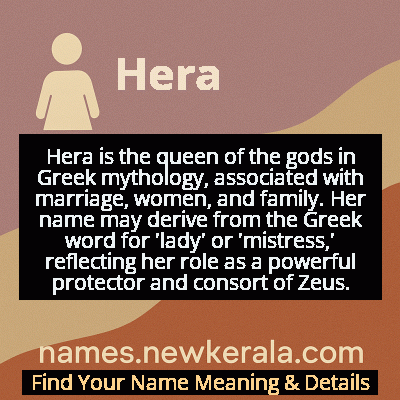Hera Name Meaning & Details
Origin, Popularity, Numerology Analysis & Name Meaning of Hera
Discover the origin, meaning, and cultural significance of the name HERA. Delve into its historical roots and explore the lasting impact it has had on communities and traditions.
Name
Hera
Gender
Female
Origin
Greek
Lucky Number
5
Meaning of the Name - Hera
Hera is the queen of the gods in Greek mythology, associated with marriage, women, and family. Her name may derive from the Greek word for 'lady' or 'mistress,' reflecting her role as a powerful protector and consort of Zeus.
Hera - Complete Numerology Analysis
Your Numerology Number
Based on Pythagorean Numerology System
Ruling Planet
Mercury
Positive Nature
Adventurous, dynamic, curious, and social.
Negative Traits
Restless, impatient, inconsistent, prone to indulgence.
Lucky Colours
Green, white.
Lucky Days
Wednesday.
Lucky Stones
Emerald.
Harmony Numbers
1, 3, 9.
Best Suited Professions
Sales, marketing, travel, entertainment.
What People Like About You
Versatility, charisma, adventurous spirit.
Famous People Named Hera
Hera Hilmar
Actress
Starred in major film productions including 'Mortal Engines'
Hera Björk
Singer
Eurovision Song Contest representative for Iceland 2010
Hera Syndulla
Fictional Character
Iconic female leader in Star Wars universe
Name Variations & International Equivalents
Click on blue names to explore their detailed meanings. Gray names with will be available soon.
Cultural & Historical Significance
Extended Personality Analysis
Those bearing the name Hera often develop personality traits reflecting their namesake's mythological attributes. They typically exhibit strong protective instincts, particularly toward family and close relationships, and may display fierce loyalty that borders on possessiveness. Heras often possess natural leadership abilities and organizational skills, with many excelling in management positions or careers requiring authority and decision-making. Their sense of justice can be uncompromising, and they may struggle with perceived betrayals or challenges to their authority. However, this strong exterior often conceals deep emotional vulnerability and a desire for stable, committed relationships. Many Heras develop sophisticated tastes and appreciate beauty in their surroundings, reflecting the aesthetic dimension of their mythological counterpart. Their combination of strength and sensitivity makes them complex individuals who command respect while maintaining deep emotional connections.
Modern Usage & Popularity
Hera has seen a notable revival in modern naming trends, particularly among parents drawn to mythological names with strong female associations. In the United States, the name entered the Social Security Administration's top 1000 names in 2022, reflecting its growing popularity. The name enjoys stronger usage in European countries like Iceland and Greece, where mythological names maintain cultural continuity. Modern Heras often appreciate their name's historical resonance while navigating contemporary contexts, with many reporting that the name inspires confidence and commands attention. The rise coincides with increased interest in powerful female figures from mythology and history, as well as the trend toward unique but meaningful names. Social media and popular culture representations have contributed to Hera's modern appeal, making it an increasingly visible choice for parents seeking a name that combines classical heritage with contemporary strength.
Symbolic & Spiritual Meanings
Symbolically, Hera represents the multifaceted nature of feminine power and authority. Her primary symbols—the peacock, pomegranate, and diadem—each carry deep metaphorical significance. The peacock's vibrant plumage and watchful 'eyes' symbolize Hera's all-seeing nature and the beauty that emerges from life's challenges. The pomegranate represents both fertility and the underworld, reflecting her connection to life's cycles and the transformative power of marriage. As goddess of marriage, Hera symbolizes the sacred commitment between partners while also representing the struggles and complexities inherent in long-term relationships. Modern psychological interpretations often view Hera as an archetype of the wife, representing both the ideal of committed partnership and the challenges of maintaining individuality within marriage. Her mythology serves as a powerful metaphor for the balance between personal power and relational commitment in contemporary life.

